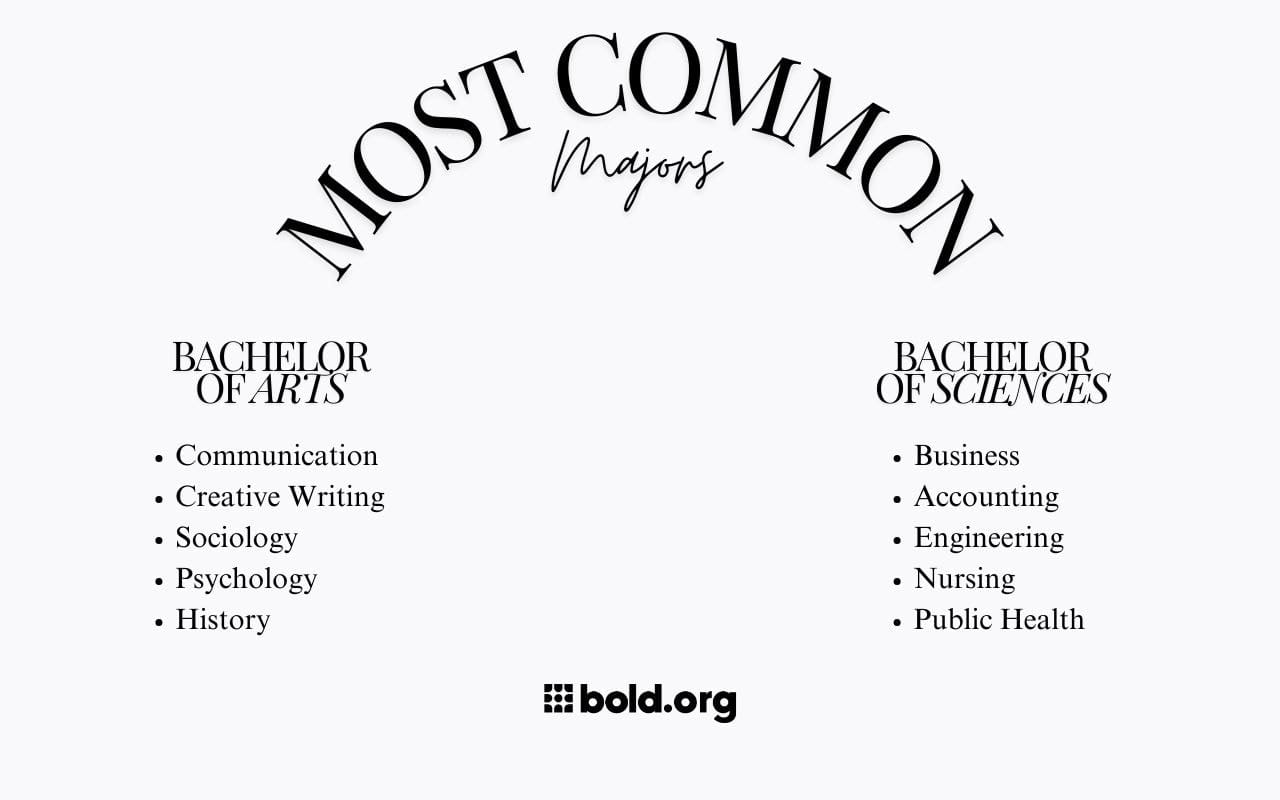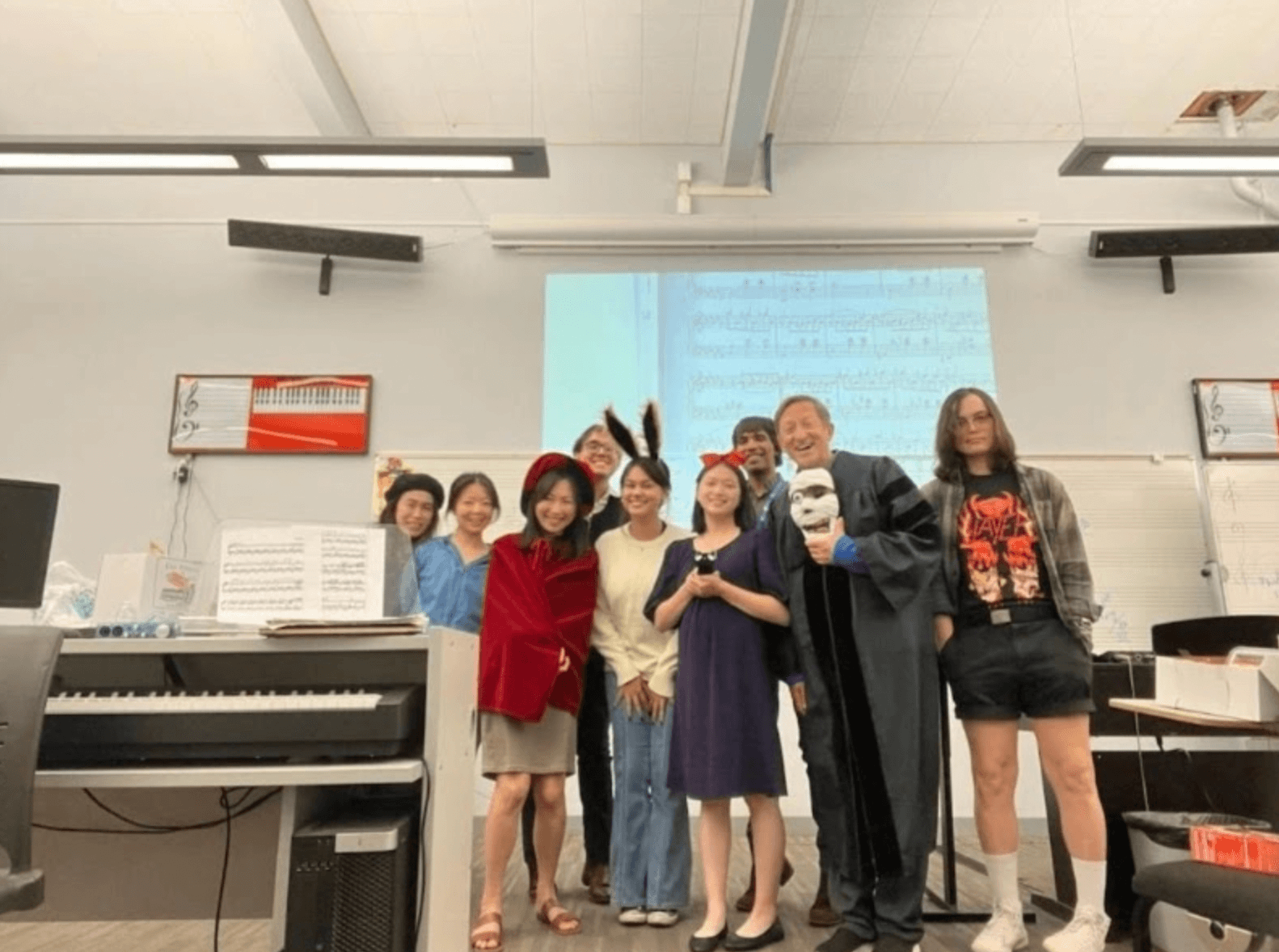Difference Between BA & BS


Preparing for your college career means knowing what you want to study or at least having a general idea of what you want to invest your time in. Whether that be psychology, literature, or even agriculture studies (yes, that’s a thing). However, while in the pursuit of higher education, choosing your degree program also means understanding what kind of bachelor’s degree you’re going for, that is a BA or BS, and if you’re anything like me, you will ask…what’s the difference?
Today I will be discussing the difference between BA and BS degrees: what to expect from each BA and BS program, what their most common majors are and how to know which degree program is best for you. If you’re a student who knows exactly what you want out of your educational and professional path, I applaud you because it’s not an easy question to answer, and if you’re a student who still hasn’t figured it out yet, I'm here to assure you, you’re not alone. So, don’t worry. I am here to (hopefully) guide you to the BA or BS program of your future.
Getting your bachelor's degree? Create a free Bold.org profile to use the scholarship search feature and access hundreds of exclusive scholarships.
Get Matched to Thousands of Scholarships
Create your Bold.org profile to access thousands of exclusive scholarships, available only on Bold.org.
Create Free ProfileDefining the Difference Between BA and BS
In the process of planning for your college career, it’s easy to forget the specifics of your degree, like whether you’ve committed to a BA or BS (not that kind of BS) program. And while I’m sure you think it doesn’t matter (like I did), trust me, it’s important to understand the specific differences between the two degrees and what to expect from them. Let’s talk about it.
What to Expect from a BA Degree
A Bachelor of Arts (BA) degree provides a broad-based education in the humanities, social sciences, and liberal arts studies. When pursuing a BA degree, students can expect to develop critical thinking, communication, and analytical skills through a variety of courses in subjects such as literature, history, philosophy, sociology, and more.
Read here for more details on how many credits are needed for a bachelor's degree and other requirements.

A Bachelor of Arts (BA) degree can also give students opportunities for research, writing, and creative expression through internships and other scholastic endeavors. With their degrees, BA students can pursue careers in education, journalism, public relations, social work, as well as humanities and social sciences. These fields of study not only give students the tools to excel in the classroom but also help them develop valuable skills in communication, problem-solving, and teamwork to exceed expectations in the real world.
While a BA degree is one of the most common undergraduate degrees in the country, students can pursue other kinds of undergraduate programs to prepare for graduate school or their desired career path. These programs are designed to provide students with a broader education in liberal arts courses.
Create Your Free Profile to Apply for Scholarships Today!What to Expect from a BS Degree
A Bachelor of Science (BS) degree typically focuses on a more specialized and technical education in natural sciences, engineering, mathematics, computer science, and health sciences studies. Students can expect to navigate through a rigorous courseload that focuses on quantitative analysis, problem-solving, and practical application of knowledge.
Students can also expect opportunities in laboratory work, research projects, and internships that provide hands-on experience in the field of study. Graduates with a BS degree usually pursue careers in science, technology, engineering, and mathematics (STEM) subjects. Depending on the institution, BSN programs provide more specialized education, focused on technical skills in data analysis, programming, and research.
You can also expect to see a large chunk of money exiting your bank account when you choose a BS degree! That's not to say college isn't worth it—a degree helps increase your starting salary and general chances of employment. But given the price tag, you should start planning ahead for how you're going to finance your BS or other degrees. Student loans, financial aid, and scholarships are a good place to start.
Apply for essay scholarships for the chance to showcase your goals and talents, or merit scholarships if you've been doing well in school. General undergrad scholarships are also easy to qualify for, regardless of who you are and what you're studying.
Choosing the Right Degree for You
Choosing the "right degree" can be tricky because there is no such thing as "right" or "wrong." So, when it comes time for your education and future career, it's important to consider things like personal interests, strengths, and career goals. Reflecting on what subjects or fields you are passionate about and enjoy studying can lead you to a program where you can excel academically. Think about your long-term career goals and the type of work you envision yourself doing in the future, and there will lie your answer.
In order to have a clear vision of what you want for your professional path, research different degree options and majors to understand the curriculum, career opportunities, and potential paths available to you. Consider speaking with academic advisors and professionals in your field, as well. They will be able to provide you with insights and advice.
Above all, the right degree for you is one that aligns with your interests, strengths, and career aspirations. The program that best suits you will provide you with the knowledge and skills needed to succeed in your chosen field, so take the time to make the decision that will set you on a path toward a fulfilling and successful career.

Most Common Majors Per Degree
Another component to knowing what degree type best suits you is knowing the different and most common majors per BA and BS degree. Let's talk about them:
Most Common BA Majors
- Communications: Communication studies is an academic discipline that focuses on the processes of human communication, including the creation, exchange, and interpretation of messages. It includes interpersonal communication, mass communication, organizational communication, and rhetoric studies. Communication also examines how communication shapes relationships, influences society, and impacts culture.
- English: English studies explores the art and craft of writing, literature, fiction, and poetry subjects. It is the study of literary techniques, narrative structures, character development, and language use to create original works of literature. English often focus on developing students' writing skills, and literature interpretation.
- Sociology: Sociology examines society, social institutions, and human behavior. It explores how individuals interact with one another, how societies are structured, and how social forces shape human behavior. Sociology studies touch on topics like social inequality, social change, culture, gender, race, class, and globalization. Sociologists use various research methods, such as surveys, interviews, and observations, to analyze social phenomena and patterns.
- Psychology: Psychology focuses on the scientific study of human behavior and mental processes, as well as the underlying psychological mechanisms that influence human cognition and emotion. Psychology studies a wide range of subfields, like clinical psychology, cognitive psychology, developmental psychology, social psychology, and neuroscience.
- History: History studies focus on past events, people, societies, and cultures. It involves the examination and interpretation of historical sources, like documents, artifacts, and oral histories, that analyze the past.

Most Common BS Majors
- Business: Business studies focuses on the principles and practices of business management, entrepreneurship, and organizational operations in areas like marketing, finance, accounting, human resources, operations management, and strategic planning.
- Accounting: Accounting focuses on the measurement, processing, and communication of financial information about economic entities, covering areas like financial accounting, managerial accounting, auditing, taxation, and financial reporting standards.
- Engineering: Engineering focuses on the application of scientific and mathematical principles to design and develop technological solutions to real-world problems in fields like civil engineering, mechanical engineering, electrical engineering, chemical engineering, and computer engineering, among others.
- Nursing: Nursing focuses on the principles and practices of nursing care, healthcare delivery, and patient well-being. Nursing students learn how to provide holistic care to individuals, families, and communities across the lifespan, as well as how to collaborate with other healthcare professionals to promote health and prevent illness.
- Public Health: Public health promotes and protects the health of populations through the prevention of diseases, injuries, and other health-related issues. Students study the influence of public health in environmental, social, behavioral, and economic health.
Though these aren't the only majors under these degree umbrellas, these are the most popular choices among students seeking an education in both the arts and sciences. Be sure to do your research on each major to know which subject will benefit you and your future most.

Benefits of Earning a Bachelor’s Degree
Earning a bachelor's degree can be such an incredible milestone in your life. I know there are those who believe going to college isn't for them, and I can respect that, but earning a bachelor's has its advantages, like:
- Increased job opportunities: Having a degree can open up more job opportunities and increase your chances of securing employment.
- Higher earning potential: A degree can lead to better-paying jobs and long-term financial stability.
- Career advancement: A Bachelor's degree can qualify you for promotions, leadership roles, and specialized positions within your field.
- Networking opportunities: College provides a valuable opportunity to build a network of peers, professors, and professionals in your field which can also lead to inter and career opportunities.
Pursuing a Graduate Degree
I know, I know--you haven't even chosen which type of degree program you want to pursue, why would you even be thinking about a graduate degree? That's easy: JUST IN CASE.
So, just in case you are thinking about the next, next step, or are even curious about it, pursuing a graduate degree can further your future that much more. Graduate degrees can consist of master's degrees, doctoral degrees, and professional degrees such as MBA or JD, which involve advanced coursework, research, and specialized training in a specific field of study. It requires a higher level of academic rigor, critical thinking, and independent research compared to undergraduate studies.
Ultimately, pursuing a graduate degree is a significant commitment that can lead to career opportunities, professional growth, and personal development. Just make sure it aligns with your personal and professional goals.
Apply for graduate school scholarships here to get a head start on planning your finances!

BA and BS Degree Career Paths
So, you've chosen your degree path, but the real question is: what can you do with it?
Since a bachelor's in arts degree focuses on humanities, social sciences, and liberal arts studies like English, history, psychology, sociology, and communication, graduates with BA degrees may find career opportunities in education, journalism, public relations, social work, counseling, and non-profit organizations.
On the other hand, a bachelor's in science degree focuses on natural sciences, mathematics, engineering, and technology-related fields such as biology, chemistry, computer science, engineering, and information technology, which can lead to careers in healthcare, research, technology, engineering, and data analysis.

Frequently Asked Questions About BA & BS
What is the difference between BA and BS degrees?
A Bachelor of arts degree focuses on humanities, social sciences, and the arts, with courses in subjects such as literature, history, philosophy, sociology, and languages. While a Bachelor of Science degree usually focuses on natural sciences, mathematics, engineering, or computer science. BS degrees often involve more hands-on laboratory work, research projects, and technical skills development. However, the main difference between a BA and a BS degree lies in their academic focus and requirements, with BA degrees emphasizing a liberal arts education and BS degrees focusing on a technical field.
What BA & BS major is best for you?
Realistically, the "best" major doesn't exist because there is no right or wrong in terms of educational aspirations. Depending on your choice of degree program, the best major for you should match your professional and personal goals. That is, if you're interested in business, your major will lean towards earning a business degree. Or, if you're interested in nursing, you'd want your program to focus on science courses. If you're not sure, do your research on majors according to the degree program to make an informed decision.
Is a graduate degree beneficial?
Yes, a graduate degree can be beneficial for anyone looking to enhance their career. A graduate degree can provide advanced knowledge and skills in a specific field that can lead to career opportunities and higher-level positions. Above all, pursuing a graduate's degree should align with your goals, but before you take the plunge, start with your undergraduate degree type first.
Start applying for scholarships! Browse through thousands of applications open for the upcoming school year at Bold.org!

About Chanelle
Chanelle is a dedicated and seasoned writer, editor, and researcher. She’s familiar with college admissions, finding and applying for scholarships, and the financial aid process.
She graduated from the University of South Florida with a major in English, Creative Writing with a specialization in Technical Writing.
Experience
Chanelle has over a decade of experience in the writing industry, specializing in blog writing, SEO writing, editing, translations, corporate writing, and various forms of creative writing. She founded and operated Femme Feature Magazine, an online and print publication dedicated to celebrating women in all corners of the creative field. An avid reader, Chanelle is constantly seeking refined and innovative ways to tell her stories. Writing is her foremost passion, and she is always on the lookout for her next narrative adventure.
Since joining the Bold.org team in 2023, Chanelle has brought her enthusiasm for merging the writing and digital worlds. She is dedicated to assisting students and young adults in navigating their educational and professional journeys.
Chanelle's unwavering commitment to her craft and her dedication to helping others shine through in her work. Leveraging her personal and professional experiences, she provides invaluable support to students, empowering them to achieve their goals and realize their potential.
Quote from Chanelle
“There is always a way to say the same thing over and over again. You just have to be creative and think outside the box.”